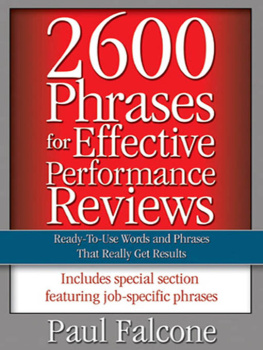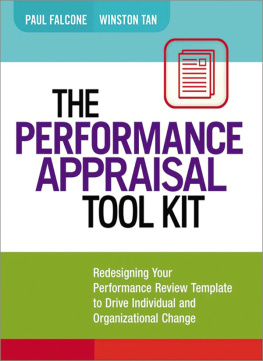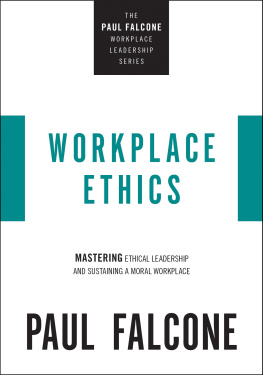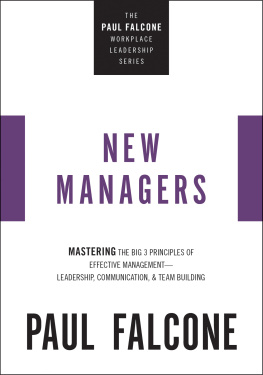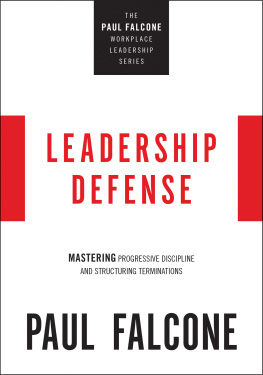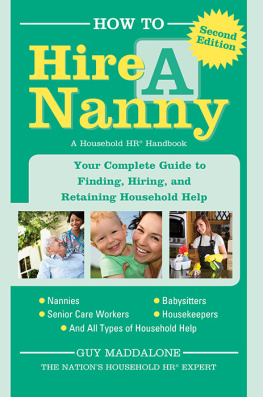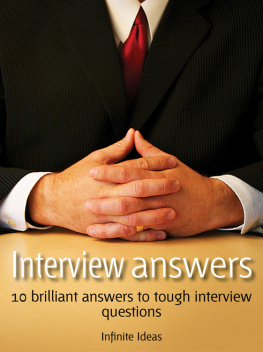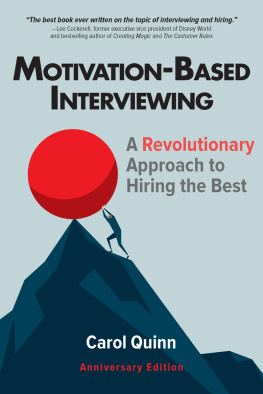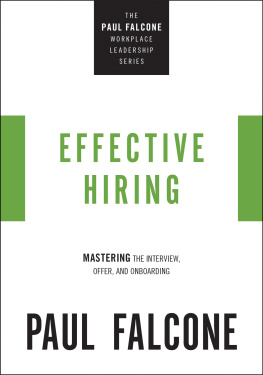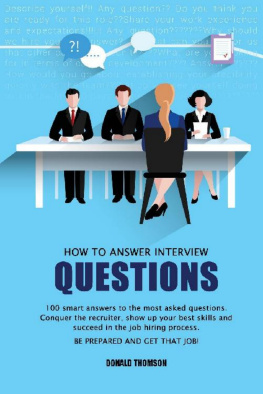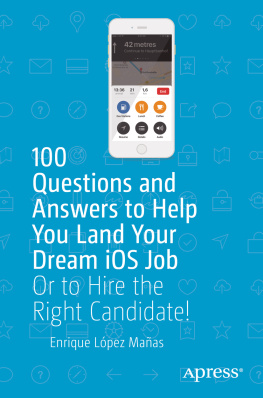96
Great Interview
Questions to Ask
Before You Hire
SECOND EDITION
96
Great Interview
Questions to Ask
Before You Hire
SECOND EDITION
Paul Falcone

Special discounts on bulk quantities of AMACOM books are available to corporations, professional associations, and other organizations. For details, contact Special Sales Department, AMACOM, a division of American Management Association, 1601 Broadway, New York, NY 10019.
Tel: 2129038316. Fax: 2129038083.
E-mail: specialsls@amanet.org
Website: www.amacombooks.org/go/specialsales
To view all AMACOM titles go to: www.amacombooks.org
This publication is designed to provide accurate and authoritative information in regard to the subject matter covered. It is sold with the understanding that the publisher is not engaged in rendering legal, accounting, or other professional service. If legal advice or other expert assistance is required, the services of a competent professional person should be sought.
Library of Congress Cataloging-in-Publication Data
Falcone, Paul.
96 great interview questions to ask before you hire / Paul Falcone.2nd ed.
p. cm.
Includes index.
ISBN-13: 978-0-8144-1351-7 (pbk.)
ISBN-10: 0-8144-1351-X (pbk.)
1. Employment interviewing. I. Title. II. Title: Ninety-six great interview questions to ask before you hire.
HF5549.5.I6F35 2009
658.31124dc22
2008025586
2009 Paul Falcone
All rights reserved.
Printed in the United States of America.
This publication may not be reproduced, stored in a retrieval system, or transmitted in whole or in part, in any form or by any means, electronic, mechanical, photocopying, recording, or otherwise, without the prior written permission of AMACOM, a division of American Management Association, 1601 Broadway, New York, NY 10019.
Printing number
10 9 8 7 6 5 4 3 2 1
To my lovely wife and best friend,
Janet,
and our two wonderful kids
Nina and Sam
more inspiration than any writer could hope for.
Contents
PART I:
Interview Questions to Identify High-Performance Candidates
PART II:
Selecting Candidates and Making the Offer
PART III:
Key Interviewing, Reference-Checking, and Recruitment Issues
Acknowledgments
To my dear friends at AMACOM Books, especially CEO Hank Kennedy and Executive Editor Christina Parisi. Thank you for your continued friendship and faith in me.
To my friends and business associates who added untold value to the development of this book as it made its way through the various rounds of editing: Dick Kaumeyer, principal of the Kaumeyer Consulting Group; Ann Kotlarski, senior litigation partner at Seyfarth Shaw LLP; Barry Nadell, president of Nadell Investigations; Larry Comp and Terry Lauter, principals of LTC Performance Strategies (formerly Humanomics, Inc.); Heather Hand, vice president of human resources for Intuitive Surgical, Inc.; and Peter Shapiro, vice president of human resources at ElectroRent Corporationyouve all been instrumental mentors in my career.
Introduction: The Parable
Once upon a time, there was a general manager in a downtown high-rise who had the final say over all new hires at her location. Although she realized how critical it was to identify and hire the best and the brightest talent for her firm, she really didnt like interviewing all that much. First, she felt fairly uncomfortable having to ask all the questions and direct the whole conversation. (Those moments of awkward silence bothered her most.) Second, she wasnt always sure of how to interpret a candidates responses, but she felt that digging deeper was inappropriate lest she be accused of prying. Third, and most important, she really resented the fact that job applicants were so schooled and rehearsed in their responses. There are just too many interviewing books and training tools available that teach people the right things to say. After a while, all their responses start sounding the same, and I dont feel like Im actually getting to know the real person, she thought.
Getting past that veneer of superficial responses was detective work, and she simply didnt have the time or the inclination to invest so much of herself into the multiple rounds of interviews necessary to bring someone aboard. After all, if the candidate doesnt work out, she reasoned, theres always a ninety-day probationary window in which to undo the hire, right? (Wrong! Its not so easy to simply dismiss people in their ninety-day introductory periods anymore. And just because your employment application has employment at will verbiage doesnt necessarily get you off the hook. Wrongful termination litigation knows no time boundaries.)
Some Options
As time went on and some less-than-optimal hires were made, this manager decided to improve her interviewing skills. She reasoned that making a serious investment in the art and science of career evaluations just once could have profound benefits throughout the rest of her career. Of course, interviewing is a skill that needs to be honed over and over again, but if she could just build more confidence in that one area, her whole approach to building superior business teams could become stronger.
So off went the general manager to her human resources department to look into training programs, books, videos, and tapes on the topic of hiring. Wow! Was she surprised to learn of the jungle of materials available. But alas, the general manager just didnt have that much time. The tapes and videos wouldve been great, but finding the time to listen to tapes or watch TV was often impossible. She had also heard that many of those training books focused a lot more on theory than on practical application. After all, if she had an interview pending with a programmer analyst, a human resources manager, a secretary, or a vice president of marketing, she needed a blueprint to successfully prepare for those specific situations.
Now, the last thing she needed was some complicated text about human resources management theory. Instead, she needed a how-to guide that she could turn to ten minutes before an interview to refresh her questioning skills. For only such a tool could lay out the unique interview questions for various hiring situations. She was, after all, responsible for hiring everyone from managers to professional/technical candidates to administrative support staff.
Finally, and most critically, she needed to know what to look out for in the candidates responses that might point to danger areas or issues for further investigation. Asking the questions was, as a matter of fact, only half of the equation. Knowing how to probe for more information after the candidates initial response was equally if not more important in gauging the real person behind the superficial responses. That is because the further you get away from the initial, structured query, the more youre called upon to employ your interpretative and evaluative decision-making skills. Therefore, she needed to know:
What might trip off danger signals in a candidates response to a particular question?
What kinds of superficial responses deserve more in-depth probing?
How could she find a way of matching the candidates personal style to her companys corporate culture?
Next page

